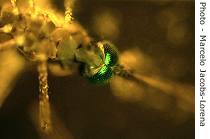2007年VOA标准英语-Genetically Altered Mosquitoes May Offer Hope t
搜索关注在线英语听力室公众号:tingroom,领取免费英语资料大礼包。
(单词翻译)
By Jessica BermanWashington
19 March 2007
Scientists say they are a step closer to showing that it may be possible to genetically2 alter mosquitoes to control malaria3, a disease that kills more than a million people in developing countries every year. VOA's Jessica Berman reports.

Transgenic mosquito
The spread of malaria is like a two-way street.
The disease is spread to humans through the bite of mosquitoes infected with malaria parasites5, the most dangerous of these being plasmodium falciparum. Uninfected mosquitoes become infected with the parasite4 by biting infected animals.
In sub-Saharan Africa and parts of Asia an estimated 300 million people are infected every year, more than one million of them are children, many of whom die.
Years of attempting to cure the disease with antibiotics6 and quinine drugs have caused the parasite to become resistant7 to treatment.
Scientists are trying to come up with novel strategies for conquering malaria. One idea that has been around for a number of years is the creation of genetically altered mosquitoes that could be released into the environment.
The so-called transgenic insects would be resistant to infection by falciparum. Through breeding, the altered insects would gradually replace the population of mosquitoes capable of becoming infected with the parasite
Marcelo Jacobs-Lorena of the Malaria Research Institute at Johns Hopkins University in Baltimore, Maryland, says investigators8 created genetically engineered mosquitoes that were more hardy9 than so-called wild-type mosquitoes that carry the parasite, and put the blood sucking insects to the test.
"What we have shown in this work that will be published is that the mosquito that carries the gene1 has an advantage if it bites an infected individual," he said.
In an article published in the journal Proceedings10 of the National Academy of Sciences, Jacobs-Lorena and colleagues report having an equal number of genetically engineered mosquitoes and wild-type insects feast on a malaria-infected mouse. After nine generations, the percent of altered mosquitoes increased from 50 percent to 70 percent.
If and when scientists are able to breed transgenic mosquitoes in numbers that might make a difference in the spread of malaria, Jacobs-Lorena says researchers have to make sure such insects do not cause an unforeseen harm.
"We have to be absolutely sure that any genetically modified mosquito does not cause any harm in the environment or cause unpredictable harm to people that they bite," he said. "But I think we are on the way."
Despite the obstacles, Jacobs-Lorena is optimistic that genetically altered mosquitoes will one day take their place alongside other strategies to fight malaria.
 收听单词发音
收听单词发音 




